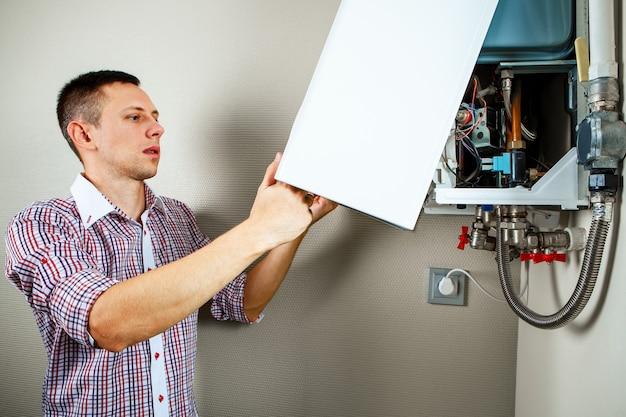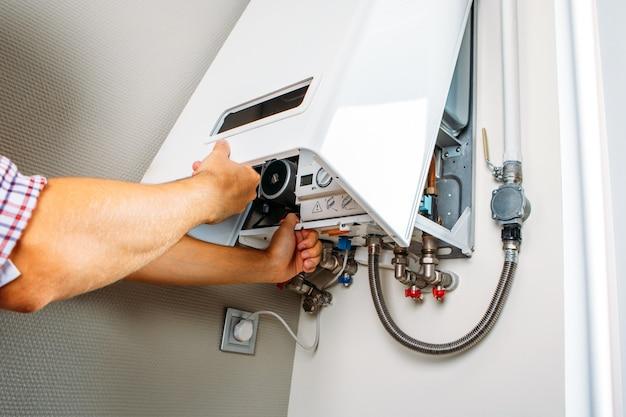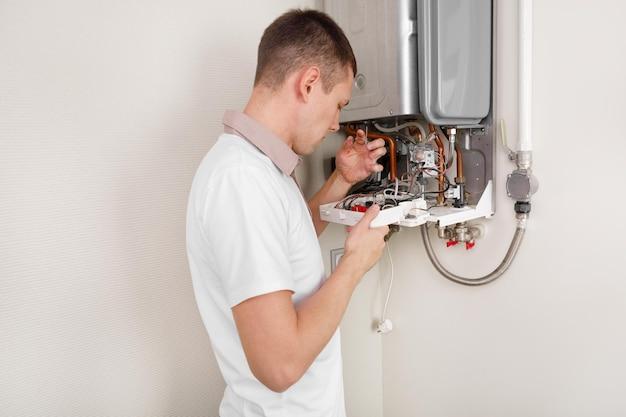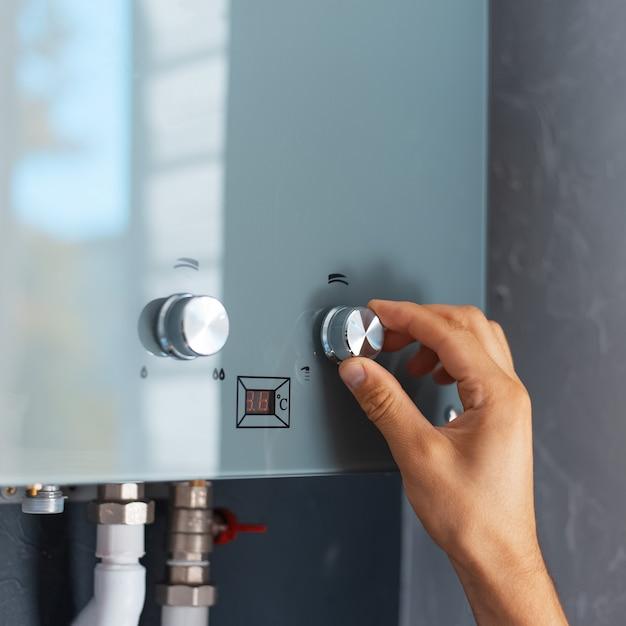Has the installation of a new water heater left you with a troubling gas smell? You’re not alone. Even after installing new water heaters, many homeowners have reported experiencing a gas smell, which can be concerning and uncomfortable.
In this comprehensive blog post, we will explore the possible reasons for gas smells after water heater replacement, including issues with ventilation and gas line connections. We’ll also discuss if it’s normal to smell gas after installing a new heater.
Don’t ignore this odor; learn how to detect a gas leak, and what to do if you suspect one. We’ll also recommend an affordable solution to help detect gas leaks before they become a major issue– the installation of a gas leak detector.
So, let’s get started on understanding why you may smell gas after a water heater replacement and what steps you can take to remedy it.
Reasons for Gas Smell After Water Heater Replacement
If you’ve recently had your water heater replaced and notice a gas smell, don’t panic, this is normal. However, it’s important to identify the cause of the smell to ensure your safety.
Burning Off Residue
When a water heater replacement is done, sometimes the residue from the manufacturing process is left inside. During the first few uses, the residue burns off and produces a gas smell. This is normal and should go away after a few days of use.
Gas Leak
A gas smell after water heater replacement could also indicate a gas leak. Gas leaks are dangerous and can lead to carbon monoxide poisoning or even explosions. If you suspect a gas leak, immediately turn off the gas supply and call a professional to inspect the unit.
Loose Connections
During the installation process, it’s possible that some connections were not properly tightened. This could cause gas to leak and produce a smell. Make sure to check all connections and tighten them as necessary.
Pilot Light
If the gas smell is persistent, it could be due to a pilot light that isn’t burning properly. This results in unburned gas and a gas smell. Check your pilot light and ensure it is lit and burning correctly.
Professional Inspection
If you’ve checked all of the above and still smell gas, it’s important to get a professional inspection. A qualified technician can pinpoint the source of the smell and ensure your safety.
In conclusion, a gas smell after water heater replacement is normal, but it’s important to identify the cause to ensure your safety. Don’t hesitate to call a professional if you’re unsure or concerned about a gas smell.
Water Heater Gas Leak Detector
If you suspect a gas leak in your water heater, you should take immediate action to ensure your safety. One of the best tools for detecting gas leaks is a gas leak detector. In this section, we’ll discuss what a gas leak detector is, how it works, and why you should consider getting one for your home.
What is a Gas Leak Detector
A gas leak detector is a device that is designed to detect the presence of gas in the air. It works by sensing the concentration of gas molecules in the air and sounding an alarm if the concentration exceeds a certain level. Gas leak detectors are commonly used in homes where gas-powered appliances are in use, such as water heaters, furnaces, and stoves.
How does a Gas Leak Detector Work
There are two main types of gas leak detectors: catalytic sensors and infrared sensors. Catalytic sensors work by heating a special material that reacts with gas molecules. When gas is present, it reacts with the material, causing it to change its electrical properties. This change is then detected by the sensor, which sets off an alarm. Infrared sensors work by emitting a beam of infrared light that is absorbed by gas molecules in the air. When gas is present, it absorbs some of the infrared light, causing the sensor to detect it and set off an alarm.
Why You Should Consider Getting a Gas Leak Detector
A gas leak detector is an essential tool for anyone who uses gas-powered appliances in their home. It provides an early warning of gas leaks, which can be extremely dangerous if left unchecked. Gas leaks can cause explosions, fires, and carbon monoxide poisoning. By detecting gas leaks early, you can take action to prevent these dangers from occurring.
In conclusion, a gas leak detector is an essential tool for anyone who uses a gas-powered water heater. It provides an early warning of gas leaks, which can be extremely dangerous if left unchecked. If you haven’t already, consider getting a gas leak detector for your home to ensure your safety and peace of mind.
Rheem Water Heater Smells like Gas
If you recently got a Rheem water heater installed or replaced, and you’re experiencing a gas smell, you’re not alone. It’s normal to feel concerned and alarmed when you perceive the smell of gas. However, before you panic and call a plumber right away, there are a few things you can check before taking any action.
Check for Gas Leaks
The most obvious reason for the gas smell is a gas leak. Before calling a plumber, you can conduct some basic checks to verify this. First, turn off the gas supply from the main valve and leave the house. If you still smell gas from outside the house, it’s highly likely that there’s a gas leak. In such a situation, calling 911 immediately is advisable since gas leaks can cause fires or even explosions.
Check for Installation Issues
Another possible reason for the gas smell is an installation issue. Perhaps something went wrong during the installation process, leading to a gas leak. Check if all the parts are installed correctly, such as the gas lines, joints, and connection pipes. If you notice any issues, calling a plumber to re-assess the installation is vital.
Check for a Dirty Burner
A dirty burner is another possible cause of a gas smell. Over time, dust and dirt accumulate in the burner, making it difficult for it to ignite correctly, leading to a gas smell. Checking the burner and cleaning it can help resolve this issue.
In conclusion, any gas smell from your Rheem water heater must be taken seriously to prevent any damages or hazards. Checking for gas leaks, installation issues, and dirty burners can help determine the root cause and prevent further problems. If the smell persists or you’re unsure, contacting a professional plumber is always the best option.
Slight Gas Smell from Water Heater Reddit
If you have recently replaced your water heater and are noticing a mild gas smell coming from the unit, you are not alone. Many homeowners have reported experiencing this issue, and some have taken to online forums such as Reddit to seek advice and guidance.
Possible Reasons for a Gas Smell
In most cases, a slight gas smell can be attributed to a few different causes:
- Residual gas: When you install a new water heater, small amounts of gas may remain in the line and tank. This can cause a faint odor in the first few days after installation.
- Leaks: While it’s uncommon, leaks can occur in gas lines or the water heater itself. If you suspect a gas leak, it’s important to turn off your gas supply immediately and seek professional help.
- Improper venting: If the water heater is not vented correctly, gas can accumulate in your home and create a slight odor. It’s crucial to ensure your water heater is installed according to manufacturer specifications and local building codes.
Steps to Take
If you notice a slight gas smell coming from your water heater, there are a few steps you can take:
- Check for leaks: Perform a visual inspection of your gas line and water heater for any signs of leaks. If you detect any, immediately turn off the gas supply and seek professional help.
- Ventilation: Ensure that your water heater is properly vented according to the manufacturer’s instructions and local building codes.
- Allow time for residual gas to dissipate: If the smell is mild and you’re confident there are no leaks, give your water heater a few days to “run-in” and let any residual gas dissipate.
- Seek professional help: If the smell persists or you’re unsure about the cause, seek professional help from a licensed plumber or gas technician.
A slight gas smell from your water heater after replacement can be unsettling, but it’s usually nothing to worry about. By checking for leaks, ensuring proper ventilation, and allowing time for residual gas to dissipate, you can address the issue quickly and safely. Always stay vigilant and seek professional help if you have any concerns or doubts about the cause of the odor.
How can you tell if your water heater is leaking gas
A gas leak in your home can be a serious safety concern, and it’s important to be able to recognize the warning signs. Here’s what to look for if you suspect that your water heater may be leaking gas:
Smell
One of the most obvious signs of a gas leak is the odor of natural gas itself. Natural gas has a distinct, sulfur-like smell that is often compared to the smell of rotten eggs. If you notice this odor around your water heater or in other areas of your home, it’s important to act quickly.
Hissing or Whistling Sound
If you hear a hissing or whistling sound near your water heater, it may indicate that gas is escaping from the system. This could be caused by a variety of issues, including a leaky valve or a damaged gas line. If you hear this sound, turn off the gas supply to your house immediately and contact a professional plumber or HVAC technician.
Physical Symptoms
Exposure to natural gas can cause a variety of physical symptoms, including headaches, dizziness, nausea, and fatigue. If you or anyone in your household experiences these symptoms in conjunction with the smell of gas, it’s important to leave the premises immediately and call 911.
Discolored or Dead Plants
Natural gas can also have an impact on the vegetation near your home. If you notice discolored or dead plants around your water heater or in other areas of your yard, it could be a sign of a gas leak.
Higher Than Usual Gas Bill
If your gas bill is higher than usual, it could indicate that there is a gas leak somewhere in your home. While this alone may not be enough to confirm a gas leak, it’s worth investigating further.
If you notice any of these signs, it’s important to act quickly to protect yourself and your family. Turn off the gas supply to your home and contact a professional plumber or HVAC technician to inspect your water heater and address any issues that may be present. With prompt attention, you can stay safe and avoid serious damage to your home.
What to Do If You Smell Gas from Your Hot Water Heater
Gas smell after water heater replacement could be a dangerous sign. If you smell gas near your hot water heater, it’s essential to act quickly to prevent any disasters. In this subsection, we’ll provide you with some simple steps that you should take to ensure the safety of your home and family.
Step 1: Do Not Panic
As crazy as it sounds, the first thing to do if you smell gas is not to panic. Keep calm and keep yourself composed. If you panic, you might end up making things worse. Instead, stay focused and act quickly.
Step 2: Turn Off the Gas Supply
The next step in handling gas smells from your hot water heater is to turn off the gas supply. You should know where the gas valve is, and you should know how to turn it off. We recommend that you switch off the gas valve yourself only if you have sufficient knowledge and experience. If you are unsure, then call a professional immediately.
Step 3: Open the Windows and Doors
After turning off the gas supply, you should open the windows and doors to allow fresh air inside your home. This helps to dissipate the gas and reduce the risk of an explosion.
Step 4: Evacuate the House
If you can’t identify or locate the source of the gas smell, it’s best to evacuate the house immediately. Never try to ignore the gas smell and hope that it will go away. It’s always better to be safe than sorry.
Step 5: Call for Professional Help
The last step is to call for professional help. A certified professional will inspect the hot water heater and determine the cause of the gas smell. They will make the necessary repairs or replacements to ensure your safety. Don’t attempt to fix the issue yourself, as this may cause more significant damage and put yourself and your family at risk.
In conclusion, smelling gas after a water heater replacement can be alarming and dangerous. Don’t ignore the signs and act quickly to ensure the safety of your home and family. Remember always to call for professional help, and never try to fix the problem yourself.
Is It Normal to Smell Gas After Installing Water Heater
If you’ve recently installed a new water heater, you may notice a distinct gas smell coming from the unit. While many homeowners find the smell concerning, it’s actually quite common, and there’s usually no need to worry.
Why Does My Water Heater Smell Like Gas
The smell of gas is often caused by the release of small amounts of natural gas from your water heater. This can happen when the unit is new, or when it’s been repaired or replaced.
The gas smell is usually nothing to worry about. It’s just the result of residual gas being released from the unit as it heats up and begins to operate normally.
How Long Will the Gas Smell Last
The smell of gas should only last a few hours or days after your water heater is installed or repaired. If the smell persists for more than a few days, or if you notice other signs of gas leakage, such as hissing or whistling sounds, it’s important to act fast.
In rare cases, gas smells can indicate a gas leak, which requires immediate attention from a qualified professional.
What Should I Do if I Smell Gas
If you smell gas coming from your water heater, it’s important to act quickly. Here are some steps you can take to stay safe:
-
Turn off the unit. If you smell gas, turn off your water heater immediately.
-
Open windows and doors. Make sure you have plenty of fresh air circulating in your home.
-
Don’t ignite any flames. This includes matches, lighters, or cigarettes.
-
Call a professional. Contact a qualified professional to inspect your water heater for signs of gas leaks.
By taking these steps, you can stay safe while ensuring your water heater is functioning as it should.
If you’ve recently installed a new water heater, it’s completely normal to smell gas for a short time. However, if the smell persists or you notice other signs of a gas leak, it’s important to act quickly to stay safe.
To ensure the safe and efficient operation of your water heater, it’s always a good idea to have it inspected by a qualified professional. They can identify any potential problems and take steps to address them before they become a major issue.



